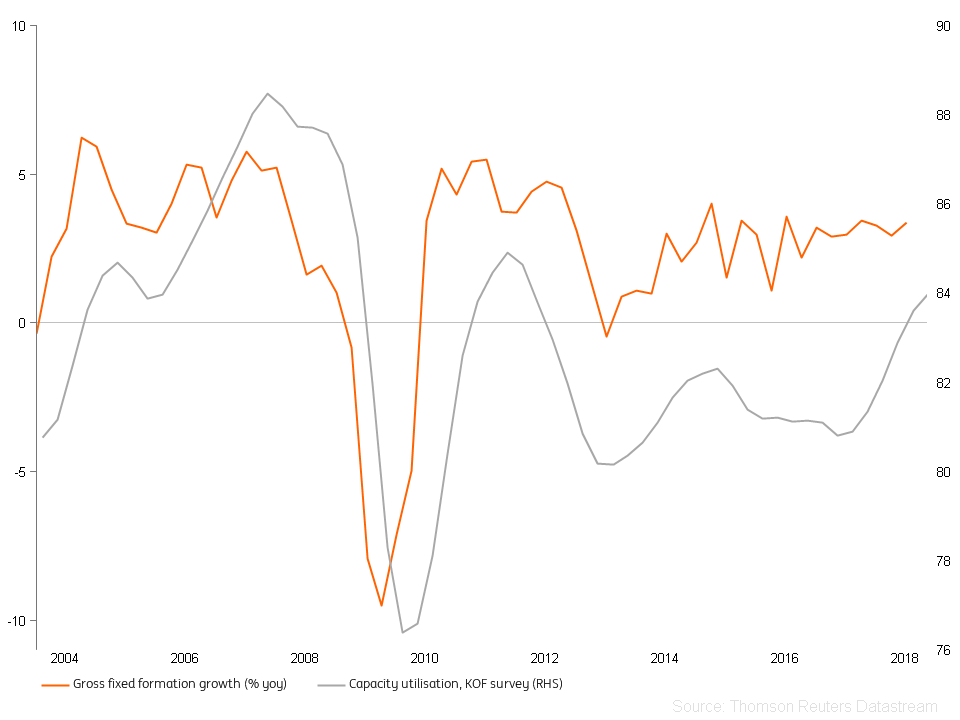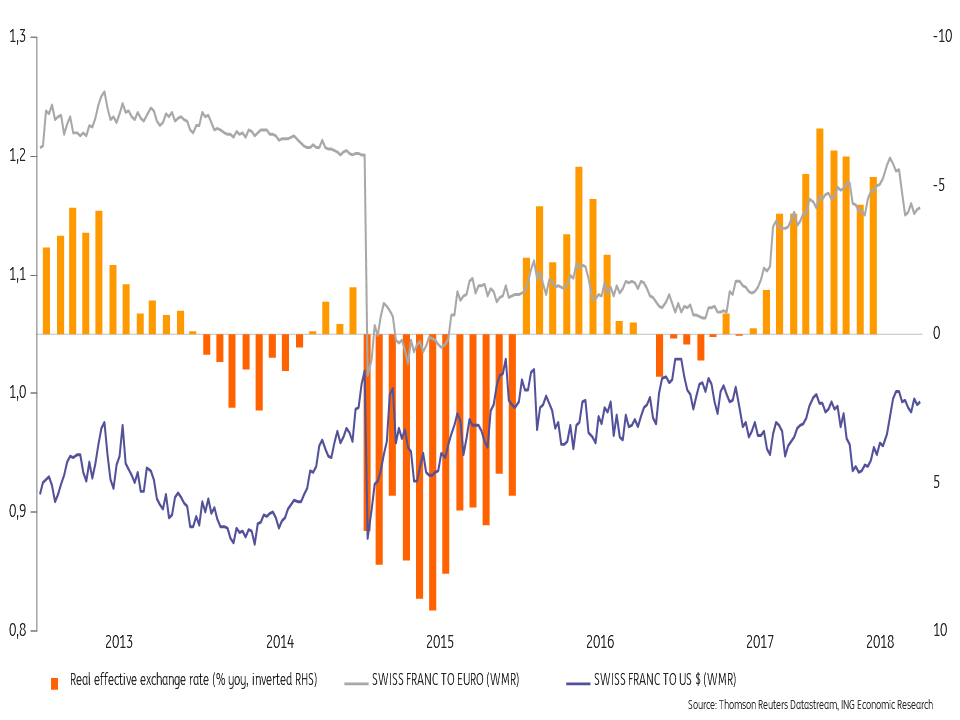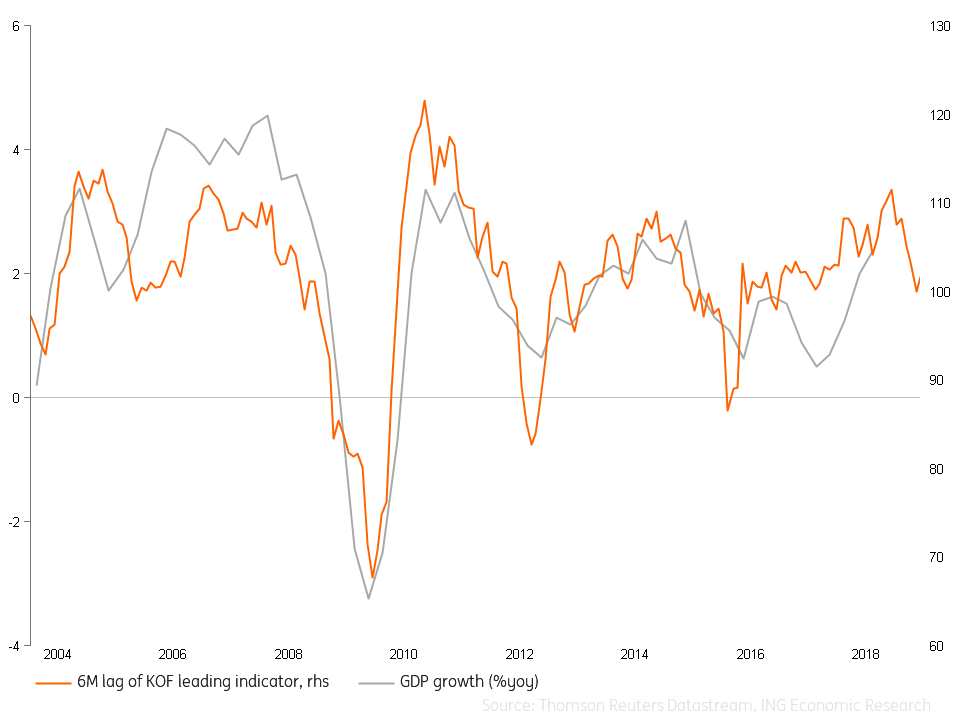Swiss Quarterly: On the right track
Even though Switzerland’s real GDP growth lost some momentum, the outlook is positive for the year ahead. Nonetheless, we’ve slightly revised our GDP forecast downwards to 2.2% and expect it to stabilise to around 2% in 2019
Internal demand supports growth in 1Q18
In 1Q18, real Swiss GDP increased by 0.56% quarter on quarter, which is slightly less than the second half of 2017 (0.73% for 3Q17 and 0.62% in 4Q17), but still above its average. Moreover, compared to the first quarter of 2017, GDP grew by 2.4% which is the strongest performance in three years.
This performance is mainly due to the service sector with trade and business-related sector recovering (+0.8% and +0.5% QoQ), while financial services (+1.0% QoQ), transport and communications (+1.3%) and healthcare (+1.2%) continued to gather pace. On the contrary, the manufacturing industry experienced a low growth situation (+0.2% QoQ) and the construction sector a stagnation.
Contrary to previous periods where growth was supported by exports, the good performance of the first quarter was due to strong internal demand. Household consumption was strong (+0.4% QoQ), investment recovered strongly (+2% QoQ, the highest quarterly growth in three years) and all of this translated into above average imports growth (+2.2% QoQ).
World Cup to post a strong calendar effect
Swiss GDP is influenced by the value-added creation of Switzerland-based international sports associations such as the International Federation of Association Football (FIFA), the Union of European Football Associations (UEFA) and the International Olympic Committee (IOC).
We believe the franc could depreciate further this year and in 2019 which would boost export growth, however, risks have definitely increased given the safe-asset nature of the currency
License income generated by the marketing of major international sporting events contributes to Swiss GDP in the same way as licenses and patents in other sectors, such as the pharmaceutical industry. This isn't particularly a problem, but from a business cycle perspective, the fluctuations caused by major sporting events cause short-term movement as they don't take place every year. This a type of calendar effect, increasing GDP during years of sports events and decreasing after that.
The Swiss administration recently started to publish GDP data adjusted for major sporting events like the World Cup or the Olympics Games, and it appears that the effect is quite significant. Adjusted for sporting events, the Swiss economy grew by 0.4% QoQ in 1Q18 compared to 0.6% QoQ without the adjustment.
| 0.2 pp |
Effect of major sport events on Swiss GDP growth in 1Q18 due to licence income of Switzerland-based international associations |
Positive outlook for investment
The upward trend in business investment is set to continue during this year and 2019, and as a result of the cyclical recovery, the use of production capacity has increased in strength.
According to the KOF industry survey, it is now again above the long-term average for the first time since the end of 2011. The increasing use of production capacity is likely to encourage companies to invest in their expansion. Moreover, the KOF industry survey indicates that industrial companies’ order books seem to be well filled and the indicator has strongly increased since January from -4.71 to 1.04 in June. It is now above its long-term average, which has never been the case in the last ten years.
The KOF survey highlights industrial production has increased again in June after the small decrease experienced during the last three months. Expected production indicators are still at their highest point since 2011., which is why we believe business investment should grow at a fast pace in 2018 (3.8%) and 2019 (3.1%).
Increasing use of production capacity would boost investment

A strong labour market
In 2017, growth in consumer spending amounted to + 1.2%. The pace has therefore slowed significantly compared to the previous two years (1.8% in 2015 and 1.5% in 2016). Even though consumer confidence was high compared to 2015 and 2016, modest nominal wage developments, higher prices reducing the real purchasing power of households and sluggish job creations weakened the dynamics of consumption in 2017.
For 2018, consumption has taken the path of a better trajectory with a 0.4% QoQ in 1Q18. For the rest of the year, we expect consumption to continue rising. Indeed, leading indicators on the labour market suggest that the situation is improving again, which would push wages up and increase consumption. The unemployment rate is on a downward trend for one year, and the vacancy rate is rising. However, since inflation is set to increase a bit more in 2018, we don’t expect to see much of an increase in real wages in the short term.
We believe that consumption will grow by 1.4% in 2018 and that the pace of growth would then consolidate further to 1.5% in 2019.
Unemployment rate is low

Exports would boost growth, but risks have increased
Give the strength of the US and the eurozone economies and the real depreciation of the Swiss Franc since mid-2017, foreign demand for Swiss intermediate and final products has strengthened. Consequently, exports contributed positively to growth in 1Q18. (0.96 pp).
The Swiss franc depreciated considerably at the beginning of 2018 and EUR/CHF reached 1.20 (the former floor) in April 2018, but since May, the exchange rate started to appreciate again as a consequence of political situations in Italy and Germany as well as the heightened risk of a global trade war.
We believe the Swiss franc could depreciate even more this year and 2019 which would boost export growth, however, risks have definitely increased given the safe-asset nature of the Swiss franc. A global trade war including the US administration's threat of new tariffs on the automotive sector, political tensions in the eurozone and difficulties with Brexit negotiations could lead to an appreciation of the franc and dampen Swiss companies’ competitiveness.
CHF volatility

Strong GDP growth expected
Risks have increased during the last few months, especially because of political uncertainties in the EU and protectionists policies. Moreover, turbulence in financial markets remains a risk for Switzerland as it could create further upward pressure on the Swiss franc, a traditional safe haven.
Internally, the real estate sector could still be a risk given the number of new constructions is still increasing, while the vacancy rate continues to grow. However, the decline in rents is expected to accelerate indicating the risk of a housing bubble is declining.
Switzerland’s leading indicator, the KOF economic barometer, fell from 108.3 in February to 100, its long-term average, in May. In June, it started to increase again to 101.6. Consequently, we have slightly revised our GDP forecast downwards for 2018 to 2.2% (from 2.3% previously) and we expect it to stabilise at 2.0% in 2019.
GDP growth on the right track

A temporary higher inflation
After a long deflationary period, inflation has been in positive territory since January 2017, thanks to higher energy prices and the CHF depreciation, which made imported goods more expensive. From 0.6% YoY in February 2018, inflation has gradually increased and reached 1.1% in June.
While a lower VAT rate, adjusted medical service prices and diminishing rents could put downward pressure on inflation in 2018, rising oil prices and higher American and European tariffs on global imported goods would push up import prices which are expected to further contribute to inflation.
Also, given the favourable economic situation, domestic price pressure should gradually increase as well because companies will gain pricing power because of stronger domestic demand. After having reached a level of 0.5% in 2017, CPI inflation is expected to climb to a modest 0.9% in 2018 and reach 1% in 2019.
Positive outlook for core inflation

Caution remains the code word for the Swiss central bank
At its June meeting, the Swiss National Bank (SNB) left its main policy rate unchanged: the target range for the 3-month Libor was maintained between -1.25% and -0.25% and the interest rate on sight deposits remained set at -0.75%. Moreover, the central bank reiterated its willingness to intervene as needed in the foreign exchange markets to prevent an appreciation of the franc.
Given that the ECB is not expecting to hike before the end of the summer of 2019, we think the SNB won’t raise rates before December 2019
The SNB still believes the franc is “highly valued” and that it is still considered a safe-haven asset. According to them, political factors in the eurozone are the main culprits for the recent appreciation of the currency. Even though it still considers the global economy will continue to grow above its potential, the assessment of the global growth outlook by the SNB was more cautious than in March. It considered trade tensions and political developments in some European countries as risks for the Swiss economy.
Given that inflation was higher than expected during the first few months of 2018, the SNB revised its conditional inflation forecast upwards, i.e. based on the assumption of no change in monetary policy for 2018 to 0.9% from 0.6% estimated in March. However, it didn't revise its forecast for 2019 (0.9%), recognising that higher inflation is due to temporary factors. Moreover, it revised its inflation forecast downwards for 2020 from 1.9% to 1.6%, which signals a rather dovish monetary policy over the next years.
We believe the central bank won’t change its policy anytime soon. Given the SNB’s worst nightmare is a strong appreciation of the franc, we believe it will wait until the ECB raises rates. The ECB's announcement that it would stop bond buying in December isn't enough on its own to make the SNB change its policy and given that the ECB is not expecting to hike before the end of the summer of 2019, we think the SNB won’t raise rates before December 2019.
This publication has been prepared by ING solely for information purposes irrespective of a particular user's means, financial situation or investment objectives. The information does not constitute investment recommendation, and nor is it investment, legal or tax advice or an offer or solicitation to purchase or sell any financial instrument. Read more
Download
Download article
10 July 2018
In case you missed it: The trade war is on This bundle contains 6 Articles